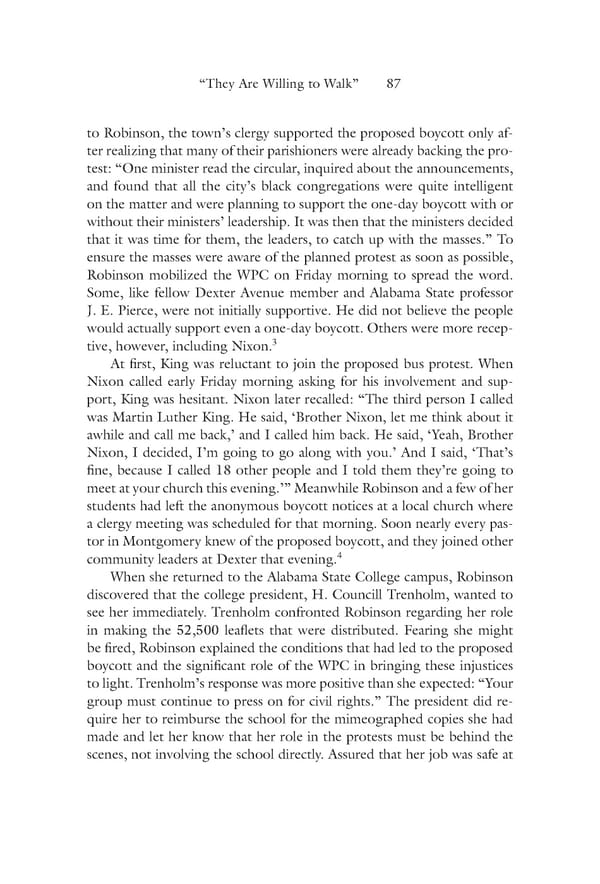“They Are Willing to Walk” 87 to Robinson, the town’s clergy supported the proposed boycott only af- ter realizing that many of their parishioners were already backing the pro- test: “One minister read the circular, inquired about the announcements, and found that all the city’s black congregations were quite intelligent on the matter and were planning to support the one-day boycott with or without their ministers’ leadership. It was then that the ministers decided that it was time for them, the leaders, to catch up with the masses.” To ensure the masses were aware of the planned protest as soon as possible, Robinson mobilized the WPC on Friday morning to spread the word. Some, like fellow Dexter Avenue member and Alabama State professor J. E. Pierce, were not initially supportive. He did not believe the people would actually support even a one-day boycott. Others were more recep- 3 tive, however, including Nixon. At first, King was reluctant to join the proposed bus protest. When Nixon called early Friday morning asking for his involvement and sup- port, King was hesitant. Nixon later recalled: “The third person I called was Martin Luther King. He said, ‘Brother Nixon, let me think about it awhile and call me back,’ and I called him back. He said, ‘Yeah, Brother Nixon, I decided, I’m going to go along with you.’ And I said, ‘That’s fine, because I called 18 other people and I told them they’re going to meet at your church this evening.’” Meanwhile Robinson and a few of her students had left the anonymous boycott notices at a local church where a clergy meeting was scheduled for that morning. Soon nearly every pas- tor in Montgomery knew of the proposed boycott, and they joined other 4 community leaders at Dexter that evening. When she returned to the Alabama State College campus, Robinson discovered that the college president, H. Councill Trenholm, wanted to see her immediately. Trenholm confronted Robinson regarding her role in making the 52,500 leaflets that were distributed. Fearing she might be fired, Robinson explained the conditions that had led to the proposed boycott and the significant role of the WPC in bringing these injustices to light. Trenholm’s response was more positive than she expected: “Your group must continue to press on for civil rights.” The president did re- quire her to reimburse the school for the mimeographed copies she had made and let her know that her role in the protests must be behind the scenes, not involving the school directly. Assured that her job was safe at
 Becoming King: Martin Luther King Jr. Page 107 Page 109
Becoming King: Martin Luther King Jr. Page 107 Page 109